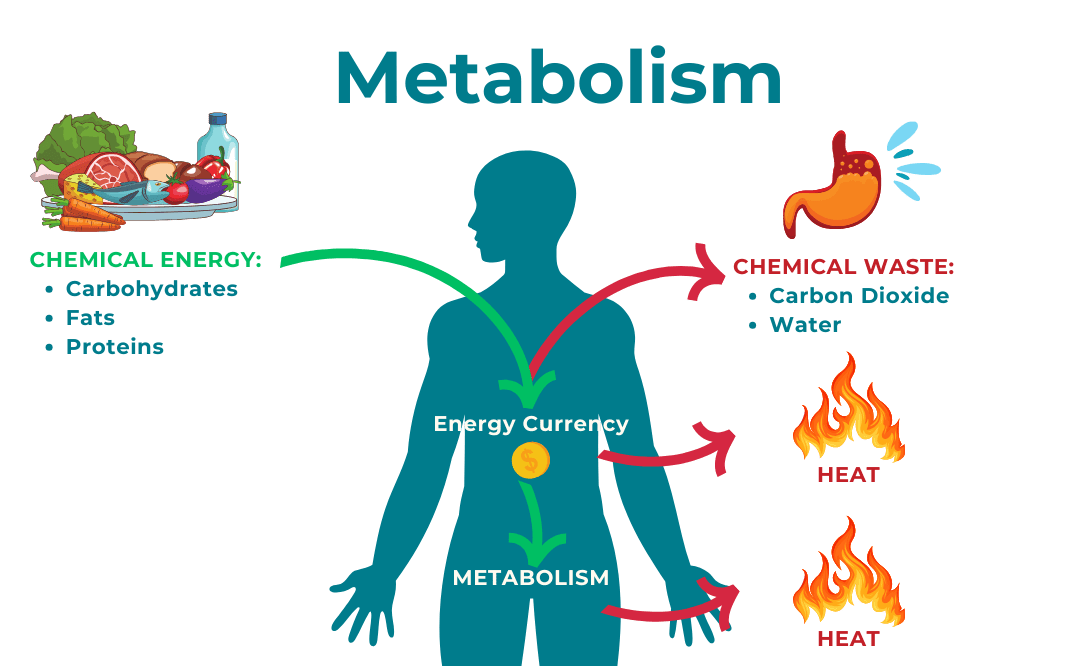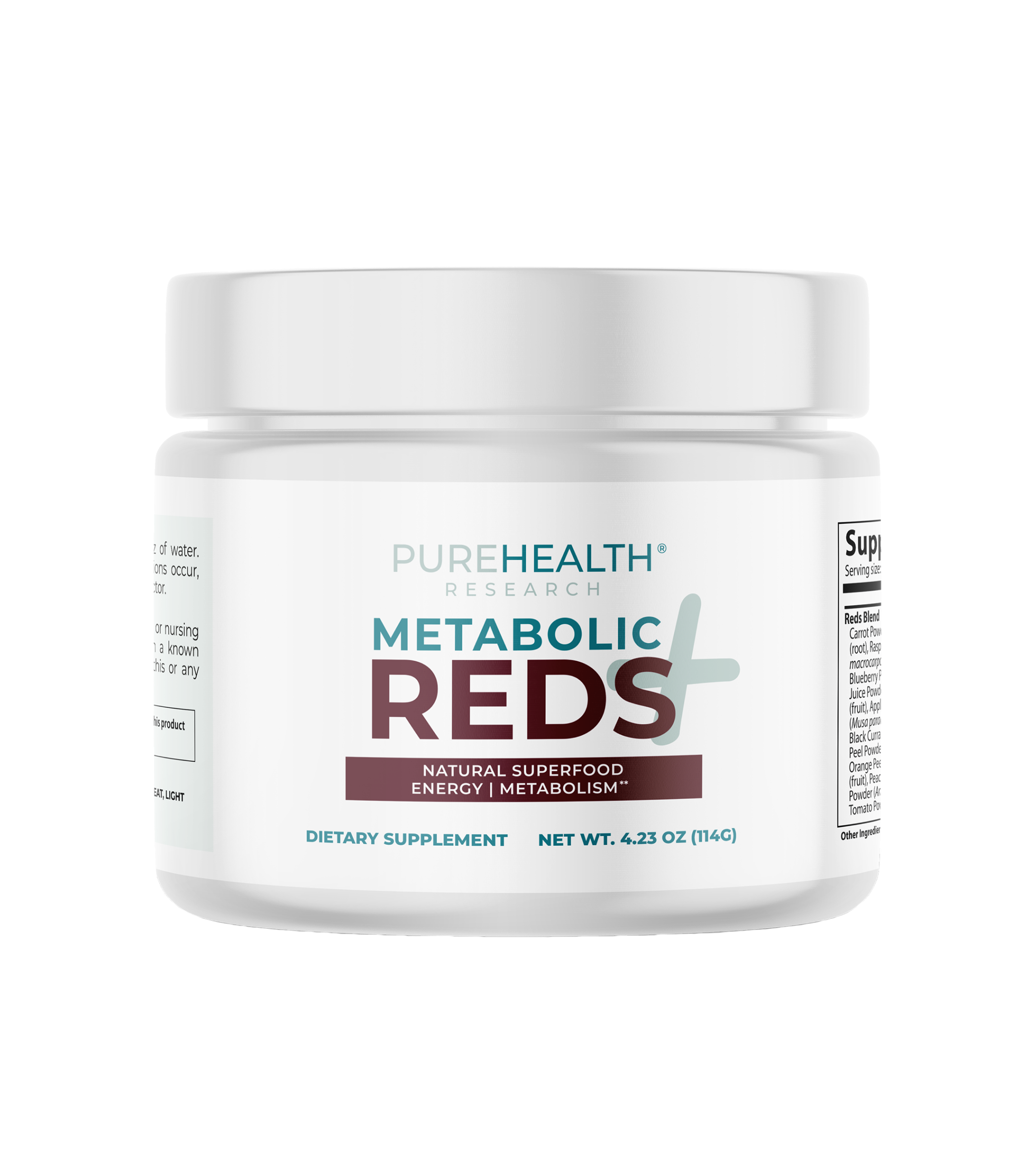How to Reset Your Metabolism in 8 Simple Ways
Looking for a definitive way to reset your metabolism and start anew? Join us as we explore eight effective strategies to help you in 2023.


Are you wondering how to reset your metabolism? This article is for you. Metabolism is a chemical reaction in the body that keeps it active and functional. Your metabolism plays a crucial role in converting nutrients from foods consumed into fuel. These nutrients give the body energy needed to breathe, move, digest, and circulate blood to repair damaged tissues.
Have you ever wished to press a reset button to reboot your metabolism and improve your overall well-being? You are not alone in this. The survey data indicated that nearly 90% of Americans don’t have optimal metabolic health.
We know this reset button doesn’t exist physically, but there are things you can do to better your metabolism. If you frequently find yourself tired or unmotivated, you may need to control your metabolism better. Changes in metabolism can occur because of many factors. Some of these include:
- Size
- Age
- Level of physical activity
- Diet
- Overall health
Most of these factors are controllable, while others aren’t. It’d be great if we could control our age with a button, but it is impossible to do so. Therefore understanding what age does metabolism slow down and other factors will help you make informed decisions on how to reset your metabolism. So, are you ready to take charge of your metabolism to improve your overall well-being? Let us dive into ways to help you reset and optimize your metabolic process.
An Insight Into Metabolism

As previously mentioned, metabolism is a chemical process that occurs in the body to convert foods and drinks into energy. It is a complicated process involving calories and oxygen to create and release energy to fuel different body functions. Your body’s metabolism is constantly active, even when you are at rest. It plays a key role in providing energy for critical body functions. Some of the main body functions it fuels include:
- Breathing
- Blood circulation
- Digestion
- Cell growth and repair
- Managing hormone levels and regulating body temperature
Metabolism can slow down due to many reasons. However, you can combat the triggers and boost your body’s calorie-burning engine. For instance, hormonal changes in decreased estrogen receptors and testosterone levels affect metabolism with age.
Stress is another factor pf slow metabolism symptoms; it increases cortisol levels leading to overeating and weight gain. Lack of sleep disrupts carbohydrates metabolism and converts energy into fats. Further excessive intake of fats will alter metabolism. Being mindful of these triggers and making proper lifestyle changes to reboot metabolism can significantly improve the body’s ability to burn calories efficiently.
Various common life mistakes can throw your metabolism in disarray and slow it down. Ideally, you’d want to avoid these if you aim to keep yourself healthy. The main error that can cause a major decrease in metabolism is not eating enough calories.
When you reduce your calorie intake, your body adjusts to this food scarcity and lowers the rate at which it burns calories. Several studies on overweight have confirmed that consuming fewer than 1,000 calories a day can notably impact your metabolic rate.
Another lifestyle error that can result in dire metabolic consequences is leading a sedentary life. It’s no secret that many people spend several hours of their day sitting at home or work. Some studies have found that watching TV while sitting burns fewer calories than standing, impacting overall health.
Understanding Metabolic Influences
Metabolism, which affects cellular functions, is an essential process in biology. Over the last centuries, our knowledge of metabolic pathways and the genomic landscape of diseases has grown tremendously. With many advances in analytical methods and other system approaches, we now possess powerful tools for studying metabolic regulations. Thanks to these tools, we have learned the many factors influencing metabolism:
- Muscle Mass – The amount of muscle mass is critical to metabolism; muscles require more energy to work compared to fat. Therefore, individuals with higher muscle mass have a higher metabolic rate. Strength-training exercises are essential for building and maintaining muscle mass and increasing metabolism.
- Age – During childhood and adolescence, rapid growth leads to multiple signs of fast metabolism. What age does metabolism slow down? The metabolic rate slows down as you age. This drop happens due to decreased muscle tissue and neurological and hormonal changes. During childhood and adolescence, rapid growth leads to a high metabolic rate.
- Body Size – People with large body sizes have a higher metabolism and larger organs and fluid volumes. Regardless of size, you can optimize metabolic functions by maintaining and increasing muscle mass through the right exercises and proper nutrition.
- Gender – Men have a faster metabolic rate than women due to different compositions and hormonal profiles. Men have a high proportion of lean muscle mass, contributing to a high metabolic rate. Understanding gender differences can help tailor strategies on how to reset female metabolism.
- Physical Activity – Exercises have a significant impact on metabolic processes. They increase muscle mass, which elevates metabolism.
- Hormonal Factors – Hormonal disorders like hypothyroidism affect the metabolism. Hypothyroidism features low thyroid hormone levels, leading to a slow metabolic rate, weight gain, and fatigue. Conversely, hyperthyroidism leads to a faster metabolic rate, weight loss, and restlessness. Therefore, proper management of hormonal imbalances, including the use of the best herbs for thyroid health, may support metabolic balance.
- Environmental Factors – Environmental changes (like increased heat or cold) force the body to work harder to retain its average temperature, leading to increased metabolism. Further, exposure to a polluted environment can also disrupt metabolic processes.
- Diet – Eating patterns and food choices also have a significant influence on metabolism. Different foods and nutrient combinations affect metabolic processes. It is critical to make the right dietary changes, such as consuming a balanced diet with adequate protective fiber, to optimize metabolism.
Resetting the metabolism is critical to losing weight and boosting energy levels. Any of these above mentioned influences in disarray hinder weight loss efforts and leave you feeling tired. Therefore, properly resetting your metabolism helps you kick-start your calorie-burning process and promotes effective weight loss.
How Long Does It Take To Reset Your Metabolism?
The duration varies for each person. Metabolism speeds up during physical activities and slows down during rest. The metabolic rate can take about 12–18 hours to return to its usual rest rate after a meal. Some studies have shown that it takes up to three days, while others indicate up to a week. The type of diet also plays a crucial role in determining this.
It is, however, critical to adopt a healthy eating routine for your body to adjust. Visible changes on the scale may also take longer to appear. Therefore, maintain hope and continue with your efforts for days or weeks. People are different; most require 6-12 months before experiencing weight loss changes after resetting their metabolism.
Maintaining a healthy diet and incorporating good exercise into your routine is critical. Are you still wondering how long it takes to reset your metabolism after 50? Worry not! Patience and perseverance will always yield good results.
How to Reset Your Metabolism?
How to reset metabolism doesn’t have to be a well-guarded secret. Armed with the right knowledge, anyone should be able to take control of this process. What’s essential to know is that toxins are in our surroundings, infiltrating the air we inhale, the water we consume, and even the food we eat.
The accumulation of these toxins within our bodies can trigger various health issues. Therefore, eliminating toxins is crucial to maintaining optimal well-being.
Regrettably, no clandestine method to improve your metabolism quickly exists, regardless of what misleading online sources may suggest.
Nevertheless, several factors can influence the pace of your metabolism, such as body weight, body fat percentage, diet, and hormones. The extent to which each factor affects metabolic rate can vary significantly.
Below is an analysis of some ways to reset metabolism, along with their actual effectiveness:
1. Prepping a Healthy Diet
Include specific foods in your diet to improve your metabolism. You can start by incorporating proteins, which have a higher thermic effect on food. The digestive process burns a significant portion of its calories after eating them. Proteins also promote muscle retention and development. Aim for daily intakes of 0.8 g/kg body weight of protein to support your metabolic reset.
It is also critical to increase fiber intake. Food rich in fiber allows you to feel satisfied with fewer calories. It is not easy to digest fiber, leading to reduced calorie absorption. This type of food also enhances digestive health and promotes efficient nutrient usage. You should aim for 14 grams of fiber per 1,000 calories.
Including these diet strategies in your routine will help better your metabolism and achieve more extended success in your overall health. As for foods you want to avoid when working on improving your metabolism, you’ll want to steer clear from refined carbs, sugary snacks, sugar-sweetened beverages, saturated fats from red meat, whole-milk dairy products, cured meats, and bacon.
2. Drink Plenty of Water
The primary key to successful weight loss is hydration. If you do not drink enough water, it will be challenging to lose unwanted weight. Some drinks like coffee, juice, or soda might be a perfect alternative in the morning; however, try to drink as much water as you can throughout the day.
Water is calorie-free and increases your metabolic rate. According to studies, drinking at least two cups of water increases your metabolic rate by 30% for almost 40 minutes. You can therefore practice drinking water a few times a day to reap the benefits and improve your metabolism.
3. Exercising
Exercise is essential for many reasons. For instance, it improves sleep, mood, and stress levels. After a good workout, the body releases endorphins, making you feel relaxed and happier. In addition, when you burn calories and fat, the body will release toxins that would have remained in the fat cells.
Like weight training, high-intensity exercise has afterburn effects. Therefore, after exercise, the muscle returns to normal functioning and metabolism. During exercise, the body consumes more oxygen related to calorie burning. Therefore, hard training results in longer recovery and increased calorie burn, increasing metabolic processes.
Similarly, HIIT exercises may increase fat oxidation and support the fat-burning process. However, if you do not have time to work out, you can still enjoy the benefits of metabolism through non-exercise activity thermogenesis (NEAT). The process involves walking while on the phone and taking the stairs instead of using the elevator. You can also park away from the office or store and walk after parking.
4. Following a Rhythm
Sometimes people must follow routines, especially for meal preparation, drinking water, or sleeping. Following a schedule will help you get enough food and quality sleep while maintaining your routine. Intermittent fasting is also critical. It involves staying away from food for a set amount of time to improve sleep and prevent weight gain.
Other strategies to follow a specific rhythm in your daily life include establishing certain eating rules for you and those in your family. For example, you can allow certain foods on specific days of the week or set a specific calorie target for a given day.
Another strategy that also works wonders is eating small meals every couple of hours. Finally, proper portion management is crucial to know your body’s right calorie intake and help it carry out a proper metabolic process.
5. Choose Your Drinks Wisely
Be careful about the drinks you consume. Always keep that in check. As we have said above, some drinks contain high sugar levels, which increases calories. Instead, you should always try to stay hydrated with water, as mild dehydration will lead to a slow metabolism. Additionally, you might wonder, does alcohol slow metabolism? The answer is yes; alcohol can indeed slow down your metabolic rate, which is why it’s advisable to moderate its consumption to maintain a healthy metabolism.
Some studies show that the consumption of green tea can boost the metabolism rate by up to 5%. Coffee also has similar effects shortly after consumption. If you still need more information on how to reset your metabolism, consulting an expert is essential to know which drinks will work better.
6. Get Enough Rest
Skipping sleep lowers the metabolism rate. It decreases calories burned and leads to weight gain. For instance, consider sleeping on time to control your weight if you struggle to fall asleep. Sleep significantly impacts your metabolism reboot since your body is, for the most part, inactive and resting. Your body consumes more energy when you are tired, and your metabolism decreases after a night of inadequate sleep.
Your body fights hard to respond when you are tired, increasing cortisol hormones. This way is how the body consumes more energy during a stressful time; cortisol increases appetite. Insulin secretion can slowly increase with an increase in stress levels. Sleeping enough to reduce stress is the best way to work on improving your metabolism.
7. Cold Exposure
Exposure to cold can also increase metabolism in two ways: shivering and non-shivering thermogenesis. The non-shivering variant occurs as a unique mitochondrial dense fat converts foods to heat and keeps the body warm without shivering.
Cold signals the nervous system to release norepinephrine, which activates brown fat to increase energy consumption. Cold-induced metabolism helps with weight loss.
Reasonable temperatures have health advantages for humans. The more you expose your body to cold, the less uncomfortable it will feel over time. Also, taking a cold shower can help promote efficient blood flow in your system.
8. Dietary Supplements
Supplements also serve many functions in the body. The main benefit of these is to help you metabolize foods. Weight loss supplements comprise a significant portion of the market, but consumers must determine if they work. One key factor is whether they can increase your metabolism.
While it is impossible to analyze every supplement scientifically, many top supplements share common ingredients. Research suggests caffeine, fiber, choline, and capsaicin can enhance metabolism and help with weight management.
If you are wondering how to restart your metabolism in an efficient manner, PureHealth Research has the answer: Metabolic Reds+. This innovative, delicious powder drink supplement helps you reset your metabolism, promotes other health benefits and makes you feel like you’re cheating. It contains various low-glycemic, real food ingredients approved by the award-winning Dr. Holly Lucille, ND, a renowned expert in natural medicine.
Metabolism is critical to our health and well-being; it affects energy levels, weight management, and immune function. Using PureHealth Research’s Metabolic Reds+, you can optimize this crucial bodily function and experience excellent benefits in your health.
The defining aspect of Metabolic Reds+ is the powerful ingredients it contains. It combines a variety of antioxidants rich in fruits and superfoods like beetroots, kale, and pomegranate. All ingredients undergo a careful selection to support metabolism and enhance overall vitality.
Metabolic Reds+ offers many additional benefits. It provides essential nutrients and supports natural body detoxification to remove harmful toxins and free radicals to promote cellular health.
Using Metabolic Reds+ helps increase your energy levels, enhance weight management, and improve digestion. The carefully selected ingredients work together to boost metabolism, support healthy blood sugar levels, and enhance nutrient absorption. It also has antioxidant properties that support healthy immunity, protect against cellular damage, and promote healthy aging.
Looking for ways on how to reset your metabolism? With the expertise of Dr. Holly Lucille, ND, and the thoughtfully selected ingredients in Metabolic Reds+, you can confidently take control of this bodily function and improve your overall well-being. What are you waiting for? Experience the transformative effects of Metabolic Reds+ today and unlock a healthier and more vibrant side of you.
Final Thoughts
In trendy health recommendations, we often isolate one aspect of metabolism and apply it universally, but altering one part does not change the whole system. Your body seeks balance and enjoys homeostasis. You can’t reset and achieve a faster metabolism only with pills. Many factors will determine how long it takes to reset this vital process.
It is about consuming fewer calories and burning more through exercise to lose weight. Meal frequency and food choices do not outweigh the fundamental principle of calorie control for your metabolism reboot. Do not rely solely on supplements or specific foods. Instead, determine your daily calorie needs and consistently track your intake. The secret is to be accountable and make meaningful changes for accurate results.
Adopt a balanced diet tailored to female nutritional needs, engage in regular physical activity, combining both strength training and cardio, manage stress through relaxation techniques.
For those pondering how to reset your metabolism, the journey begins with embracing a diet rich in proteins, healthy fats, and complex carbohydrates, incorporating a mix of strength training and cardiovascular exercises, prioritizing sleep and hydration, reducing stress and practicing mindfulness.
Individual factors like age, genetics, and dedication to lifestyle changes play a role seeing results. However, many notice improvements in energy and weight within a few weeks. For a complete metabolic overhaul, consistent efforts over several months might be necessary.
Sign up for our Healthy Living newsletter!
Advertisement. This site offers health, wellness, fitness and nutritional information and is designed for educational purposes only. You should not rely on this information as a substitute for, nor does it replace, professional medical advice, diagnosis, or treatment. If you have any concerns or questions about your health, you should always consult with a physician or other health-care professional. Do not disregard, avoid or delay obtaining medical or health related advice from your health-care professional because of something you may have read on this site. The use of any information provided on this site is solely at your own risk.












